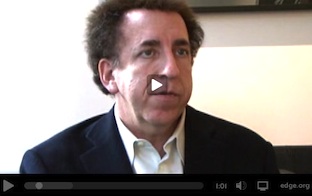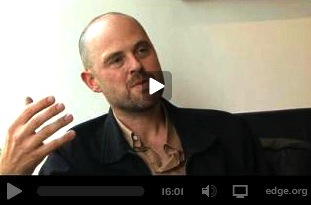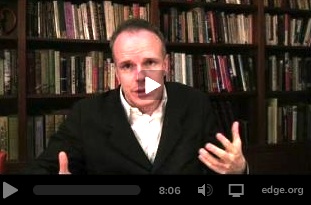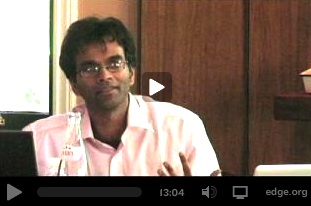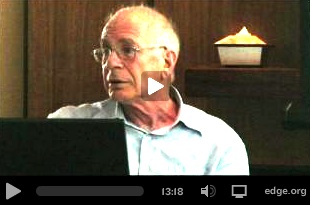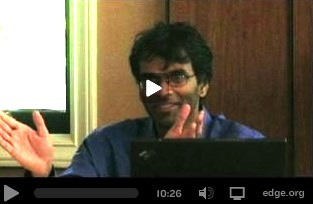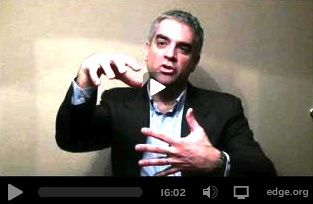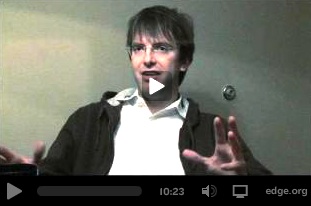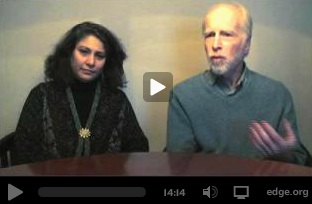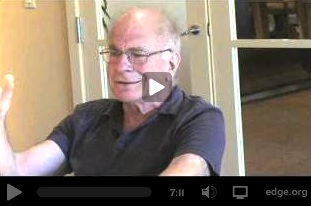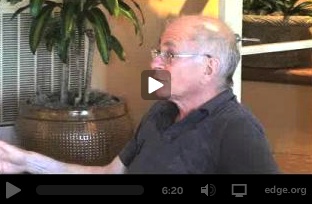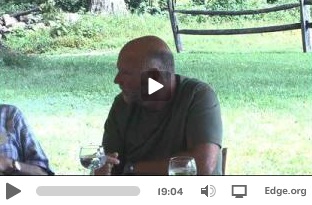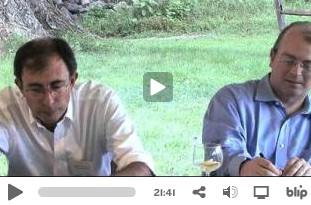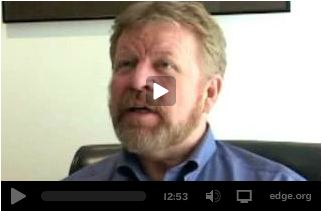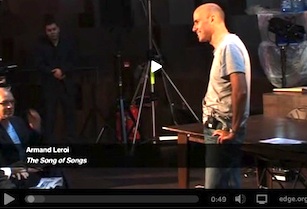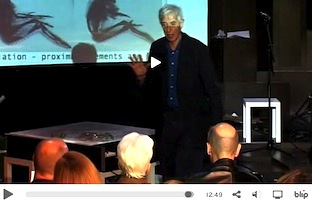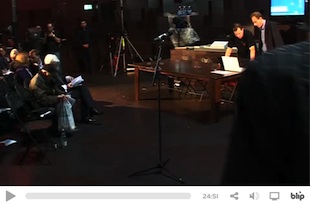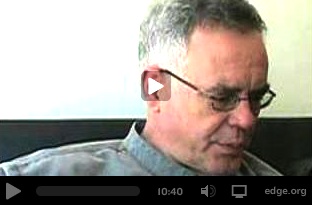|
EDGE CONVERSATION
CHANGING LIFESTYLE CHANGES GENE EXPRESSION Founder and president of the non-profit Preventive Medicine Research Institute
|
|||
|
|
|||
|
EDGE CONVERSATION
LIFE IS THE WAY THE ANIMAL IS IN THE WORLD Professor of Philosophy at the University of California; Author, Out of Our Heads
|
|||
|
|
|||
|
EDGE CONVERSATION
A RULE OF THE GAME Curator, Serpentine Gallery, London; Editor: A Brief History of Curating; Formulas for Now
|
|||
|
|
|||
|
EDGE MASTER CLASS 2008 |
|||
|
|
|||
|
IMPROVING CHOICES WITH MACHINE READABLE DISCLOSURE (CLASS 2) THALER: Father of Behavioral Economics; Director, Center for Decision Research, University of Chicago Graduate School of Business; Co-Author, Nudge At a minimum, what we're saying is that in every market where there is now required written disclosure, you have to give the same information electronically and we think intelligently how best to do that. In a sentence that's the nature of the proposal.
|
|||
|
|
|||
|
THE PSYCHOLOGY OF SCARCITY (CLASS 3) Professor of Economics at Harvard Nathan Myhrvold, Richard Thaler, Daniel Kahneman, France LeClerc, Danny Hillis, Paul Romer, George Dyson, Elon Musk, Jeff Bezos, Sean Parker Let's put aside poverty alleviation for a second, and let's ask, "Is there something intrinsic to poverty that has value and that is worth studying in and of itself?" One of the reasons that is the case is that, purely aside from magic bullets, we need to understand are there unifying principles under conditions of scarcity that can help us understand behavior and to craft intervention. If we feel that conditions of scarcity evoke certain psychology, then that, not to mention pure scientific interest, will affect a vast majority of interventions. It's an important and old question. |
|||
|
|
|||
|
TWO BIG THINGS HAPPENING IN PSYCHOLOGY TODAY (CLASS 4) Eugene Higgins Professor of Psychology; Author, Thinking Fast and Slow
There's new technology emerging from behavioral economics and we are just starting to make use of that. I thought the input of psychology into economics was finished but clearly it's not! THE REALITY CLUB W. Daniel Hillis, Daniel Kahneman, Nathan Myhrvold, Richard Thaler on "Two Big Things Happening In Psychology Today" |
|||
|
|
|||
|
THE IRONY OF POVERTY (CLASS 5) Professor of Economics at Harvard I want to close a loop, which I'm calling "The Irony of Poverty." On the one hand, lack of slack tells us the poor must make higher quality decisions because they don't have slack to help buffer them with things. But even though they have to supply higher quality decisions, they're in a worse position to supply them because they
|
|
EDGE CONVERSATION
MODELING THE FUTURE Climatologist, is a professor in the Department of Biological Sciences Warming is unequivocal, that's true. But that's not a sophisticated question. A much more sophisticated question is how much of the climate Ma Earth, a perverse lady, gives us is from her, and how much is caused by us. That's a much more sophisticated, and much more difficult question. |
|
|
|
|
|
EDGE CONVERSATION
ANTS HAVE ALGORITHMS Assistant Professor, Department of Ecology and Evolutionary Biology, Princeton University
|
|
|
|
|
|
EDGE CONVERSATION
SOCIAL NETWORKS ARE LIKE THE EYE Physician and Social Scientist, Harvard University; Coauthor, Connected: The Surprising Power of Our Social Networks and How They Shape Our Lives
|
|
|
|
|
|
EDGE CONVERSATION
ENGINEERING BIOLOGY Assistant Professor of Bioengineering, Stanford University
|
|
|
|
|
|
EDGE CONVERSATION
THE IMPLICIT ASSOCIATION TEST ANTHONY GREENWALD is Professor of Psychology at University of Washington MAHZARIN BANAJI Psychologist; Richard Clarke Cabot Professor of Social Ethics, Department of Psychology, Harvard University
"The IAT provides a useful window into some otherwise difficult-to-detect contents of our minds. It may be "an inconvenient truth" that what's there is not what we thought was there or want to be there. But I think it is generally something we can come to grips with." — Anthony Greenwald |
|
|
|
|
|
EDGE MASTER CLASS 2007 |
|
|
|
|
|
Eugene Higgins Professor of Psychology; Author, Thinking Fast and Slow
|
|
|
|
|
|
Eugene Higgins Professor of Psychology; Author, Thinking Fast and Slow
|
|
|
|
|
|
Eugene Higgins Professor of Psychology; Author, Thinking Fast and Slow
|
|
|
|
|
|
Eugene Higgins Professor of Psychology; Author, Thinking Fast and Slow
|
|
|
|
|
|
Eugene Higgins Professor of Psychology; Author, Thinking Fast and Slow
|
|
|
|
|
|
Eugene Higgins Professor of Psychology; Author, Thinking Fast and Slow
|
|
|
|
|
|
EDGE SEMINAR 2007 |
|
|
|
|
|
LIFE: WHAT A CONCEPT! Professor of Physics, Institute for Advanced Study; Author, Many Colored Glass; The Scientist as Rebel
|
|
|
|
|
|
LIFE: WHAT A CONCEPT! Professor, Harvard University, Director, Personal Genome Project
|
|
|
|
|
|
LIFE: WHAT A CONCEPT! Leading scientist of the 21st century for Genomic Sciences; Co-Founder, Chairman, CEO, Co-Chief Scientific Officer, Synthetic Genomics, Inc.; Founder, President and Chairman of the J. Craig Venter Institute; author, A Life Decoded We're just at the tip of the iceberg of what the divergence is on this planet. We are in a linear phase of gene discovery maybe in a linear phase of unique biological entities if you call those species, discovery, and I think eventually we can have databases that represent the gene repertoire of our planet. |
|
|
|
|
|
LIFE WHAT A CONCEPT Professor Emeritus of Chemistry and Senior Research Scientist, New York University; Author, Planetary Dreams
|
|
|
|
|
|
LIFE: WHAT A CONCEPT! Professor of Astronomy, Harvard University; Director, Harvard Origins of Life Initiative
|
|
|
|
|
|
LIFE: WHAT A CONCEPT! Professor of Quantum Mechanical Engineering, MIT; Author, Programming the Universe
|
|
|
|
|
|
EDGE CONVERSATION
RECURSION AND HUMAN THOUGHT Linguistic Researcher; Dean of Arts and Sciences, Bentley University; Author, Language: The Cultural Tool
|
|
|
|
|
|
EDGE CONVERSATION Professor of Evolutionary Developmental Biology, Imperial College; Author, Mutants
|
|
|
|
|
|
EDGE CONVERSATION
A COOPERATIVE FORAGING EXPERIMENT: LESSONS FROM ANTS Research Fellow in Evolutionary Biology, Institute of Zoology, Zoological Society of London
|
|
|
|
|
|
EDGE CONVERSATION
HOW OUR LIMBS ARE PATTERNED LIKE THE FRENCH FLAG Professor of Biology, University College London
|
|
|
|
|
|
EDGE CONVERSATION
SO WOMEN HAVE BETTER EMPATHY THAN MEN? Psychologist, Autism Research Centre, Cambridge University; Author, Zero Degrees of Empathy
"It turns out that when you test newborn babies—this experiment was done at the age of 24 hours old, where we had 100 babies who were tested looking at two kinds of objects—a human face and a mechanical mobile. And they were filmed for how long they looked at each of these two objects. What you can see here is that on the first day of life, we had more boys than girls looking for longer at the mechanical mobile and more girls than boys looking at the face. So you can see that these differences when they emerge, first of all they seem to emerge very early—at birth—suggesting that there may be a biological component to a sex difference in, in this case, interest in faces; and secondly, they don't apply to all males or all females, these differences emerge as statistical trends when you compare groups." |
|
|
|
|
|
EDGE CONVERSATION
A FULL-FORCE STORM WITH GALE WINDS BLOWING Evolutionary Biologist; Professor of Anthropology and Biological Sciences, Rutgers University; Author, The Folly of Fools
|

